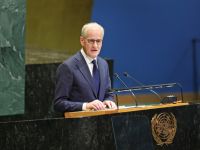On last Thursday, 175,000 men and women went to the polls in the Sultanate of Oman to elect a new 83-member Majlis al-Shura, which will sit from 2001 to 2003. But, while the Gulf State claims to be among the few countries in the region to hold popular elections, the degree to which the parliamentary council will express and execute the will of the people is open for debate.
For one, it was the government, which decided who was eligible to vote—and roughly 90 percent of the country’s 1.7 million citizens were not provided that privilege. And two, its role is only consultative. The council is not asked to consider matters related to defense or foreign policy. In fact, its only role is to advise the Omani leader, Sultan Qaboos, on economic issues.
But, despite these limitations, there was heightened public interest on polling day. Of the 175,000 approved voters, some 115,000 tribal leaders, intellectuals and leading business figures signed up for the privilege, as opposed to 51,000 people in the previous 1997 election. There were fewer people standing for election–556 candidates, down from 736 in the last poll.
Also, the number of female candidates fell from 27 to 21. Still, two women were ultimately elected to the council: businesswoman Lujaina Moshin Haider Darwish and Rahila al-Riyami, the education ministry’s planning director.
The public’s greater readiness to get involved in last week’s election may have been influenced by a number of burning economic issues on the Omani agenda. The council will need to consider ways of diversifying the national economy away from oil, as Oman prepares to enter the World Trade Organization and face its associated challenges. At the same time, the council will be asked to consider what to do with the country’s significantly higher than expected oil revenues, which have come about a result of the recent hikes in the price of crude.
As things appear at the moment, income from higher oil prices will slash approximately OR 100 million ($260 million), or 30 percent from OR 349 million ($906 million) budget deficit, which earlier had been forecast for 2000. During the first six month of the current year, oil revenues rose 68 percent to OR 757.4 million ($1.97 billion), compared to the first half of 1999.
As a result of this windfall, the Omani central bank canceled its planned issue in September of what would have been this year’s third government development bond, which was expected to be valued at OR 30 million ($78 million). The earlier February and June issues, which helped finance the government’s short- and medium-term requirements, were each highly over-subscribed.
Oman was recently accepted as a member to the World Trade Organization, and its policymakers appear to have recognized the need to diversify the economy and enhance the country’s non-oil export capacity. Earlier efforts have proven successful; with non-oil export revenues through the first half of the year reaching OR 131 million ($340 million), compared to OR 94 million ($244 million) during the same period in 1999.
On September 11, the government signed a memorandum of understanding with the Salalah Port Services (SPS), appointing SPS the project manager of a free trade zone project in the southern city. The first phase of the FTZ is expected to be launched during the first quarter of 2001.
The country’s export drive will serve to complement recently introduced measures to attract foreign investment. Earlier this year, the Omani government lowered corporate taxes on non-local firms and relaxed foreign ownership restrictions in the country. And now, with the government’s newfound oil revenues, multinationals may soon be presented with a package of attractive investment prospects. – (Albawaba-MEBG)







